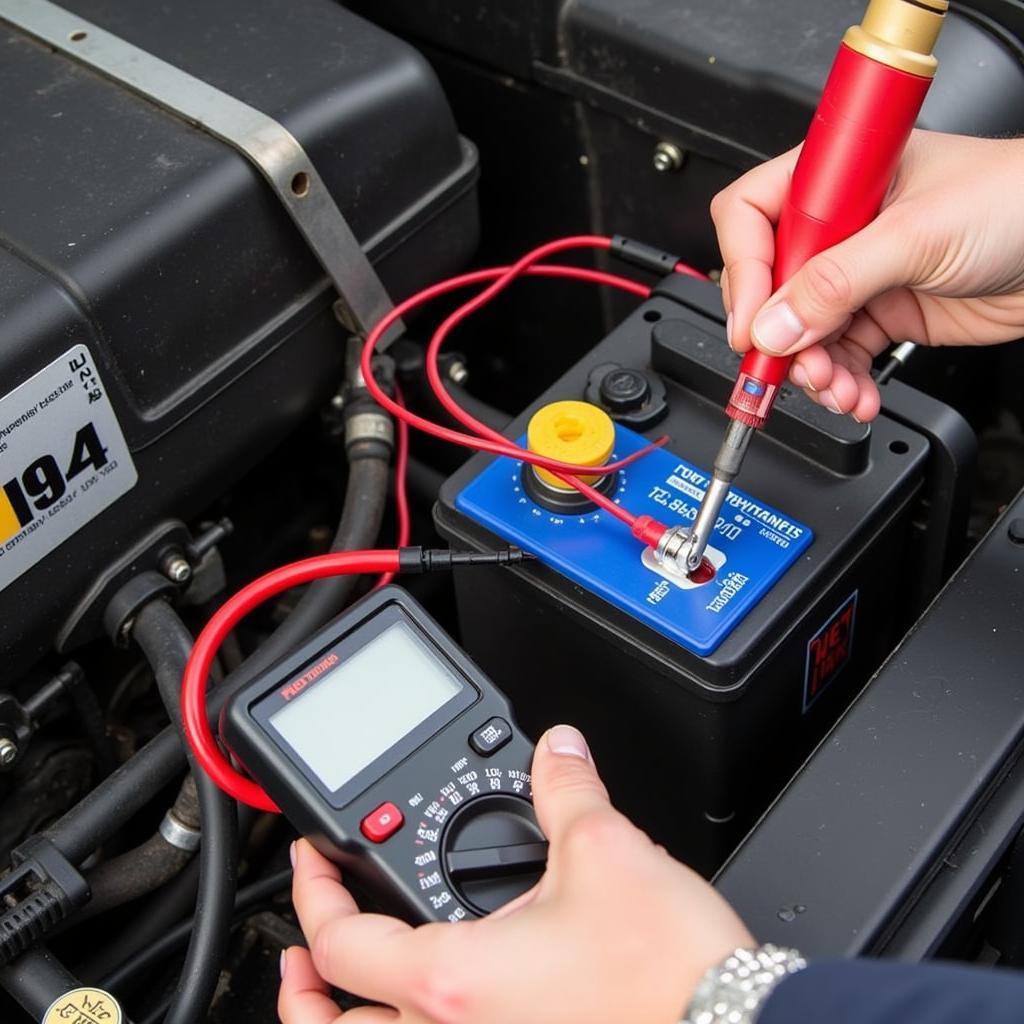Car Electrical Testing Tools are essential for diagnosing and troubleshooting electrical issues in vehicles. From simple multimeters to advanced diagnostic scanners, these tools empower mechanics and DIY enthusiasts to pinpoint problems quickly and accurately, saving time and money on repairs. Choosing the right tools can be overwhelming, so this guide will cover everything you need to know about car electrical testing tools, from basic functionality to advanced features. Shortly after this introduction, you’ll find a helpful guide on car battery-related tools: tools for car battery.
Essential Car Electrical Testing Tools for Every Mechanic
Every mechanic needs a core set of electrical testing tools to effectively diagnose common car problems. These include:
- Multimeter: A versatile tool for measuring voltage, current, and resistance. Crucial for checking battery health, circuit continuity, and component operation.
- Test Light: A simple tool to check for the presence of power in a circuit. Useful for identifying blown fuses, broken wires, and faulty switches.
- Circuit Tester: More advanced than a test light, a circuit tester can provide more detailed information about circuit voltage and current draw.
- Battery Load Tester: Specifically designed to test the health of a car battery under load, simulating starting conditions.
- Wiring Diagram: Essential for understanding the complex wiring systems in modern vehicles. Provides a visual map of circuits and components.
 Multimeter and Test Light: Essential Car Electrical Testing Tools
Multimeter and Test Light: Essential Car Electrical Testing Tools
Understanding the specific functions of these essential tools is crucial for effective diagnostics. For example, using a multimeter to test battery health requires connecting the probes to the battery terminals and reading the voltage. A healthy battery typically reads around 12.6 volts.
Advanced Diagnostic Tools for Complex Electrical Systems
Modern vehicles feature increasingly complex electrical systems, requiring more sophisticated car electrical testing tools for accurate diagnosis. These tools include:
- Diagnostic Scanners (OBD-II): These tools connect to the vehicle’s onboard computer and retrieve diagnostic trouble codes (DTCs), providing valuable insights into the root cause of electrical issues.
- Oscilloscope: Used to visualize electrical signals, allowing mechanics to identify intermittent faults and analyze signal patterns for sensor and actuator performance.
- Lab Scope: A more advanced oscilloscope with features tailored for automotive applications, providing detailed waveform analysis for complex systems.
- Electrical System Testers: These comprehensive tools combine multiple diagnostic functions into a single unit, streamlining the testing process.
These advanced tools can significantly reduce diagnostic time and improve accuracy. Consider this scenario: a car experiences intermittent starting issues. While a multimeter might reveal a low battery voltage, it might not identify the underlying cause. A diagnostic scanner can reveal a faulty crankshaft position sensor, providing a targeted solution. You might also find our article about car audio removal tools useful: car audio removal tools.
Choosing the Right Car Electrical Testing Tools
Choosing the right tools depends on your level of expertise, budget, and the type of repairs you typically perform. DIY enthusiasts might find a basic multimeter and test light sufficient for simple tasks. Professional mechanics, however, require a more comprehensive set of tools to handle the complexities of modern vehicles. Resources such as car workshop tools singapore can be particularly helpful.
What tools are needed for basic car electrical testing?
A basic multimeter, test light, and a set of wiring diagrams are essential for basic testing.
What are the most important considerations when choosing a diagnostic scanner?
Consider factors like vehicle compatibility, software updates, features, and user-friendliness. If you’re interested in tools related to car batteries, you might find our article about the Klein Tools CL1000 helpful: klein tools cl1000 car battery.
How can I learn to use car electrical testing tools effectively?
Online resources, training courses, and hands-on practice are invaluable for developing proficiency with these tools. DiagFixPro offers information about real estate tool kit for car.
Conclusion: Empowering Diagnostics with the Right Car Electrical Testing Tools
Investing in the right car electrical testing tools is crucial for efficient and accurate diagnosis. From basic multimeters to advanced diagnostic scanners, these tools empower mechanics and DIY enthusiasts to tackle any electrical challenge. By understanding the functionality and application of these tools, you can streamline your diagnostic process, save valuable time, and ensure reliable repairs. Remember to choose tools that match your skill level and the specific needs of your automotive work.
FAQs
- What is the most basic car electrical testing tool? A multimeter.
- What does OBD-II stand for? On-Board Diagnostics, Second Generation.
- Why is a wiring diagram important? It provides a visual map of the car’s electrical system.
- What can an oscilloscope measure? Electrical signals and waveforms.
- What is a DTC? Diagnostic Trouble Code.
- What is the purpose of a battery load tester? To test the battery’s ability to hold a charge under load.
- What are some examples of advanced car electrical testing tools? Diagnostic scanners, oscilloscopes, lab scopes, and electrical system testers.
Common Car Electrical Testing Scenarios
-
Dimming headlights: Could indicate a failing alternator or a poor connection. Tools: Multimeter, test light.
-
Car won’t start: Could be a dead battery, faulty starter, or ignition problem. Tools: Multimeter, battery load tester, diagnostic scanner.
-
Check engine light: Requires a diagnostic scanner to retrieve DTCs and identify the issue.
Further Exploration
For more information on specific car diagnostic tools and techniques, explore other articles on DiagFixPro.
If you need further assistance, contact us via WhatsApp: +1(641)206-8880, Email: [email protected] or visit us at 910 Cedar Lane, Chicago, IL 60605, USA. Our customer support team is available 24/7.

Leave a Reply